The fusion of product development and seamless operational management, named DevOps, has been around for quite some time.
Since DevOps came into existence, its determination has been strong enough to become the heartthrob of the IT world.
- Global Market Insights, The future of DevOps is very promising.
- It will grow at over a CAGR of 20% by the end of 2026.
- Verified Market Research forecasts the global DevOps market will reach $20.01 Billion by 2026.
Information Week has declared that the demand for DevOps technology and the engineers will rise high with zero chances of slowing down.
These predictions bring positive vibes: the demand for the technology will stay consistently high.
Like the technology, the demand for DevOps engineers in the job market has grown approx. 40-45% for the past 3-4 years.
If you are looking forward to establishing your career as a DevOps engineer, you are on the right track.
But, before moving forward to how to become a DevOps engineer, let’s discuss what DevOps engineering is and how it benefits business enterprises.
The road map will then seem complete.
What does a DevOps Engineer do?
DevOps came into the IT world to make IT services more agile.
- The technology caters to collaboration, communication, and integration among IT operations and software developers.
- Instead of different teams working on a project, DevOps enables employees to work as a single team, stepping out of their silos.
- DevOps engineers are IT professionals holding in-depth knowledge and skill regarding the software development pipeline.
- They analyze the shortcoming of the previous product development, the benefits of the new model, Etc.
- Additionally, a DevOps engineer must acquire knowledge and skill in advanced automation tools to stay upfront.
A DevOps engineer has to undertake the following responsibilities:
- Project Planning
- Software Development
- Product Deployment
- Integration Professional
- Software Testing
- Quality Assurance
- Security Engineer
- Automation
- Maintenance and Troubleshooting
Why Are Organizations Willing To Hire DevOps Engineers?
The adoption of DevOps brings about the following benefits to a business organization:
Technical Benefits:
- Defect detection becomes effortless.
- Problems become less complex.
- Engineers can fix issues efficiently.
- Software release velocity increases rapidly.
Business Benefits:
- Software delivery turns into a consistent process.
- Software development and business operation environments become more stable.
How to Become a DevOps Engineer
Hardly any business organization harbors uncertainty regarding DevOps adoption in their work environment.
As per ZDnet, 74% of business organizations worldwide have adopted DevOps in some form.
Whether you are already a part of the IT ecosystem or a newbie, the competition out there is stiffening.
Now let’s head directly towards the required skill and approaches crucial to growing your career as a DevOps Engineer.
Understanding DevOps Culture
Before you jump on the wagon, understanding the DevOps culture is the first stepping stone to your DevOps engineering career aspiration.
Since DevOps brings different teams working under the same roof, DevOps culture is free from the blame game.
The goal is fixed and standard. So, one team’s efficiency or inability affects the entire collaboration.
Instead of “Why should I do it?”, try to say, “I will see what I can do.”
Programming Knowledge
It is a basic skill one requires to become a DevOps professional.
- Programming language knowledge and skill open your career to a vast horizon of career possibilities, including DevOps.
- A DevOps professional has to handle debugging code, automated development, and software deployment to integrated database changes. Thus, programming or scripting languages is a concerning requirement for DevOps engineers.
- DevOps aspiring candidates can consider learning advanced programming languages like Python, Ruby On Rails, Perl, etc., to scale their efficiency.
Read Full Content






0 Comments